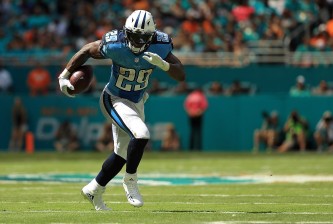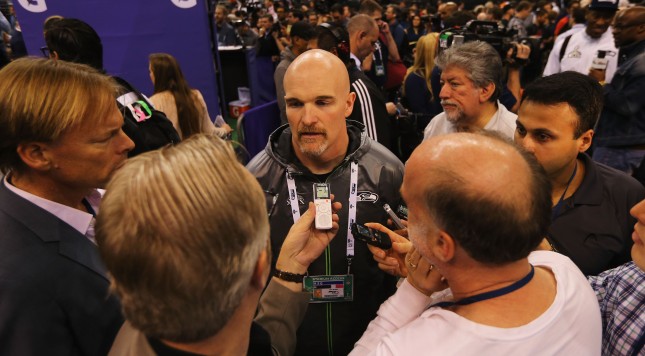The same issue occurs every year in the NFL. Often, it impacts the same upper-echelon coaches and teams.
We’re talking about the outdated rule that prohibits coaches on playoff teams from taking a job, even agreeing in principle, with another franchise. Therefore, the coaches who help teams reach the Super Bowl or go deep in the playoffs have almost no chance of getting hired for a “quality job” unless a team is willing to risk missing out on good assistants.
For the past couple of years, Seattle Seahawks defensive coordinator Dan Quinn has been interviewed by many teams. And, by many accounts, he has impressed said teams. He hasn’t been hired for a head coaching job yet, although the Atlanta Falcons appear to be waiting in the wings to land him.
The media often gripe about the Rooney Rule, but rarely does anyone take the time to inspect the other rule, which governs coaching searches around the league.
It is time for a change.
How often has this been a problem? Think about Adam Gase, Dan Quinn, Darrell Bevell and even Jack Del Rio last season. All were tied to at least one head coaching opportunity in 2014. None were hired despite all four coaching in Super Bowl XLVIII. No team hired any of the four Super Bowl coordinators.
Nobody wants the NFL to become like college football, with assistant coaches (and sometimes head coaches) disappearing before bowl games, but there’s no reason that the rule can’t be altered.
There’s a potentially ugly solution to the problem. But there’s also a sound one.
The messy solution is to allow coaches to agree in principle or even to sign with a new team, but to force them to remain with their old team until their postseason run is complete. This would be workable and wouldn’t be a drastic change from the current model, but it does present some interesting problems and questions.
The first problem is that hiring assistant coaches would be tricky and would have to be mostly left up to the team. It would rob the new head coach of having a say in the process, something that most coaches prefer when assembling a staff.
The big question that would be asked deals with how much attention a coach would pay to his old team while trying to balance his responsibilities there with his new job.
The clean solution, which would present none of the above issues, is to stop teams from hiring anyone until after the Super Bowl is played. With the NFL draft date moved to May, it would allow for new coaching staffs to have time to evaluate players and give new coaches the opportunity to hire assistants. It would also open up the market completely as all coaches would be available at the same time. No team would have an advantage, and coaches wouldn’t have to focus on anything but the task at hand.
Historically, many teams that make coaching changes also make changes in the front office. With the proposed format, front office hires could still be completed prior to the Super Bowl. This would give management time to get settled and prepare adequately for selecting a coach. It would be a front office “grace period” that would prevent a rookie GM from having to hastily assemble a list of coaching candidates and set up interviews. Teams would be able to take the time necessary to find the best candidates for both jobs without having to worry about losing out because of the current system’s convoluted rules.
The only coordinator in the last five years to become a head coach immediately after coaching in the Super Bowl was Bill O’Brien (after the 2011 season). He went to Penn State. In the same five-year span, coordinators like Jim Caldwell and Joe Philbin were hired after the following season. Were these men unqualified the year before when their teams played in the Super Bowl? Or were teams in need skittish about waiting for a new coach to become available?
Forcing teams to wait on all coaching hires until all teams are on an even playing field is essential to making sure that the best coaches get promoted on time, and that teams have a real chance to evaluate and choose from a full pool of candidates. It could lead to less turnover and better results, as well as make the league more competitive from top to bottom.























